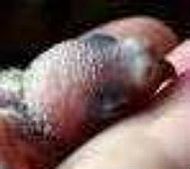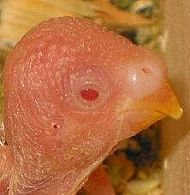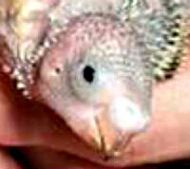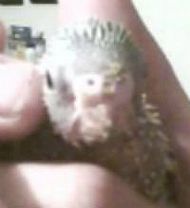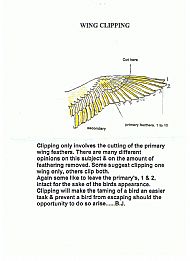HEALTH PROBLEMS WITH PICTURES..
UNMATED EGG LAYING. SEXING CHICKS IN THE NEST.
X RAY OF EGGBOUND HEN. CLAW CLIPPING.
WING FEATHER CLIPPING. FEATHER PLUCKING..
UNMATED EGG LAYING IN PET HENS.
It is quite normal for unmated cage bird hens to lay eggs. It will NOT automatically lead to her death. An un-mated laying pet hen is no more likley to die than a breeders hens.. Although egg laying is natural, like child birth has its dangers...
Records from a Belgium laboratory give the number of eggs laid by unmated hens in any one season have ranged from 1 to 30.... Over a 9 yr period one Budgie hen laid 300 eggs. The laying of 20 or more eggs is not a particular rare event in pet un-mated hens. According to a recent survey conducted by myself, in the 2012 breeding season. The laying of 20 to 30 eggs without any adverse affect on the hens general health is not an uncommon occurance.
Rather than go into the complicated changes that take place in a hens body as she reaches maturity. I'll keep it very simple & say, under normal conditions, a hens egg laying cycle is controled by her hormonal level which rises as conditions become suitable for raising a family by longer sunny days & the rains bringing on a super abundance of food. Then lowering at the seasons end for the moult, rest & recuperation.
The extra healthy diet of the pet bird is also inpart responsible for excess egg laying, along with being provided with all the requirements needed to encourage breeding condition.
Unfortunately a pet hen owner has no way of knowing just how strong their hens urge or hormonal level is to lay. The advice (Cure) for this problem usually entails some distruption to the hens environment & longer sleep time to simulate winter.
Hens with a low hormonal level will only lay a very few eggs approx 1 or 2, before stopping of their own accord . If the cure is applied immediately it would appear to have worked?
Hens with a normal hormon level can lay a full clutch of eggs approx 5 or 6, before stopping. Again the cure appears to works? if you persist.
Hens with a high hormonal level can lay a full seasons compliment of eggs before stopping & there are many reports that some hens are immune to any & all the owners efforts to stop her laying. So the cure doesn't work in some cases?? Or they all work if you persevere. Long enough.....
My advice would be to provide nesting facilities & let nature take its course. Any attempt to stop her only results in a very unhappy bird & why would want to upset your pet when she's only doing what comes naturally?.
------------------------------------------------------------------------------------
FEATHER PLUCKING
Cage-mate culprit.
If the culprit is a cage mate, usually indicated by feather removal from the victims head area & has been going on for a day or two. The only cure is seperation before the victim is badly injured.
Hoping it is just a harmless squabble & doing nothing, is ignoring the pain& stress of the victim.
This bullying behaviour has been known to escalate. The bully increases his/her own personal space. Although it may only start as, "keep away from me." It can escalate to, "get off my perch." Finally extending to, "everything in this cage is mine, go away. Or else!" But the poor wretched victim has nowhere to go.
Self plucking.
Usually from the chest area but can be any area reachable by the beak. At the very first of suspicion of self plucking. See your vet for a complete check-up.
This self mutilation is usually a serious & unsightly condition the cause of which can only be guessed at without a visit to your vet.
He will take various samples for analysis etc & usually send you home with an expensive solution that may or not, help with your birds problem. While you await the results of the tests....
When the results comeback with good news. Rub on the cream & all is well. If the news comes back that none of the usual parasitic or vitamin deficiency type problems, are the culprits.
Then the only ones left are either a food allergy usually a pellet problem. Or one of poor lighting, living conditions, sights, sounds, smells, loneliness & boredom.
Perhaps a psychological responce to something real or imaginary & any others I've forgotten to mention. All you can do make sure your bird has the best living conditions you can provide.
Even though a cure for the initial cause may be found & the correct remedy supplied & applied. The self plucking in many cases can become habit forming, like nail biting in humans. The birds continue to self mutilate even though it causes them pain & discomfort.
Sorry not much of a happy ending to this post but no post like this would be complete without an on old wives tale. (Apologies to any old wives,) Published in an Australian 1990's, 'Parakeet Care Book'.
An overweight bird will pluck out feathers because its skin feels stretched, uncomfortable, itchy & tight..Like Grandads combinations..Yea right..


